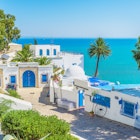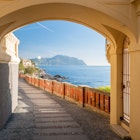
The best times to visit Sicily, a year-round destination

Mar 17, 2024 • 5 min read

Choose the best time for your visit to Sicily with this seasonal guide © Chiara Magi / Shutterstock
With its sizzling hot beaches and choice of three blue seas to dip in, summer has always been the hottest time of year to visit Sicily. Yet there’s so much more to Italy’s paradise island than flopping on gold or black sand with August’s ferragosto holiday crowd, cooling off over a riot of water-based activities and toasting endless long summer days with an Aperol spritz.
Each Sicilian month has its own beauty. This, coupled with the cultural heavyweight’s portfolio of world-class monuments and museums, makes the island an appealing destination all year. As already-scorching summer temperatures seem to spiral increasingly higher, the cooler shoulder seasons are becoming more fashionable. Couple this with a surge in slow, meditative exploration through rural landscapes and traditions – both of which Sicily boasts in spades – and you have the making of a whole new "best: season to visit Sicily.
Note: breakfasting on a sweet brioche bun dunked into blackberry granita and breaking mid-afternoon for creamy gelato crafted from island almonds, figs or pistachios is perfectly acceptable every month of the year.

April, May, September and October are best for outdoor action and epicurean pleasures
With fairly reliable sunshine and the mercury hovering at a pleasant 68°F (20°C) or so, spring and early fall are ideal for winding along precipitous coastlines on foot, scaling volcanoes – Mount Etna in eastern Sicily and Stromboli on the eponymous Aeolian island – and hiking through flower-strewn meadows and up craggy peaks in the mountainous interior. Even with the milder temperatures, the Sicilian sun is fierce: bring a sunhat, sun protection and ample water before hitting trails and archeological sites such as Valley of the Temples, Segesta and Selinunte where there is no or little shade.
On the coast, you can beach-lounge and sea-dip without feeling like a sardine. May ushers in top-drawer diving and snorkeling (until October) in waters around Sicily’s offshore islands; diving schools in Ustica, Lipari and Lampedusa typically open mid-April to late October.
Accommodation prices remain reasonable and sights are blissfully uncrowded. More importantly, it is warm enough to lap up Sicily’s chill cafe vibe and enjoy its banquet of traditional cuisine al fresco – terraces in Palermo, Catania and smaller towns mushroom outside in early spring and operate well into October.
For epicureans, springtime stalls at Palermo’s Mercato del Capo and Catania’s fruit-and-veg market by its legendary La Pescheria fish market are piled high with asparagus, artichokes, fennel, fava beans and honey-sweet strawberries. Traditional sagre (food festivals) celebrating grape, olive, chestnut and pistachio harvests pepper September: Bronte’s pistachio festival, San Vito La Capo’s couscous festival and Castelbuono’s mushroom fest in October are well worth planning a trip around.

June to August are best for cooling sea dips, beach life and festivals
Though scorching hot and often crowded with vacationers, Sicily’s beaches are the place to be in summer, with their dreamy blue waters and always spectacular views. In Palermo, striped sun shades are draped full-length over apartment balconies by 10am, and on the coast, parasol-shaded sun loungers at private beach clubs fill fast. Come armed with water shoes to scamper into the sea – pebbles and rocks can be as hot as coals by noon in July and August.
Alongside its searing temperatures (rendering an afternoon siesta the only sensible option), August can raise the curtain on the Sirocco wind: this hot and fierce "hairdryer" wind blows in from the south and can reach near-hurricane speeds. Occasionally, dust from the North African deserts reddens Sicilian skies, and temperatures soar.
When the sun goes down and temperatures cool, open-air concerts, film screenings and theater performances are a dime a dozen. From May to July, world-class actors perform at Syracuse's 5th-century-BCE amphitheater during the Festival del Teatro Greco. Catania's four-night world music festival Marranzano raises the curtain on a glittering cast of international artists at historic monastery Monastero dei Benedettini in June, while a summertime ticket to a Taormina Arte performance at Tormina's Teatro Greco is Sicilian gold. On the eco-conscious Aeolian Islands, do your bit in July at Stromboli’s Festa di Teatro Ecologico, ushering in 10 days of theater, dance and music – no electricity involved – on an open-air stage on the island.

February and March ring in religious celebrations, street parties and almond blossoms
Sicilian skies are not always sunny, and temperatures remain cool, but the period around Easter is a lens on local tradition. Many towns celebrate carnival on Mardi Gras – one of the most flamboyant is in Sciacca on the southwest coast. Easter festivities climax in Trapani, where traditional guilds parade life-sized wooden statues of the Virgin Mary and other Biblical figures through the streets for four days during the mesmerizing La Processione dei Misteri.
Patron saint celebrations are equally festive: one million-odd Catanians follow a silver reliquary of St Agata through the city streets during Catania's Festa di Sant'Agata in early February. Almost as spectacular this month are the island’s blossoming almond trees, notably celebrated at Agrigento’s Valley of the Temples with Sagra del Mandorlo in Fiore – an almond blossom festival with folkloric music and dance between the ruins.
November to January is the best time for budget travel
Sicily’s low season sees traditional beach towns and offshore islands in the Aeolian and Egadi archipelagos largely shut down. Many hotels, restaurants, beach clubs and hydrofoil routes close completely for a couple of months. Inland, temperatures can dip to 0°C or below.
Yet this is when accommodation rates island-wide can drop by 30% or more; a long weekend break in Palermo, a week off-grid amid the forests of the Parco delle Madonie or an off the beaten track adventure in northeastern Sicily’s Nebrodi mountains will be a bargain for visitors traveling on a budget. Blockbuster churches, museums and galleries can be enjoyed in peace and relative solitude. Dining is more spontaneous – no need to worry about making table reservations weeks in advance at the most popular addresses.
Mt Etna and the highest peaks of the Madonie and Nebrodi mountains are typically snow-capped from December to late March. January is the best month to hit the slopes in the low-key ski resorts of Piano Provenzana and Piana Battaglia.
Explore related stories








 Local VoicesItaly vs Croatia: which Mediterranean country is right for you?
Local VoicesItaly vs Croatia: which Mediterranean country is right for you?Jun 13, 2024 • 8 min read
 Tips & Advice3 of this summer's best under-the-radar vacation spots in Italy
Tips & Advice3 of this summer's best under-the-radar vacation spots in ItalyMay 24, 2024 • 4 min read
